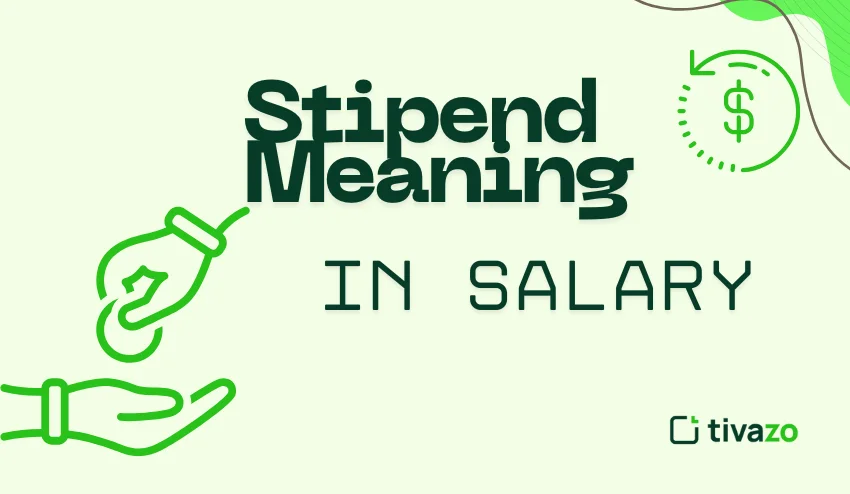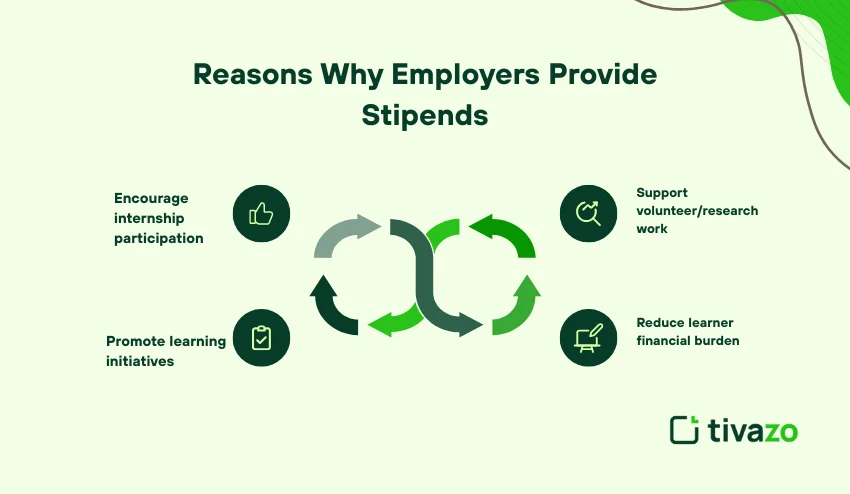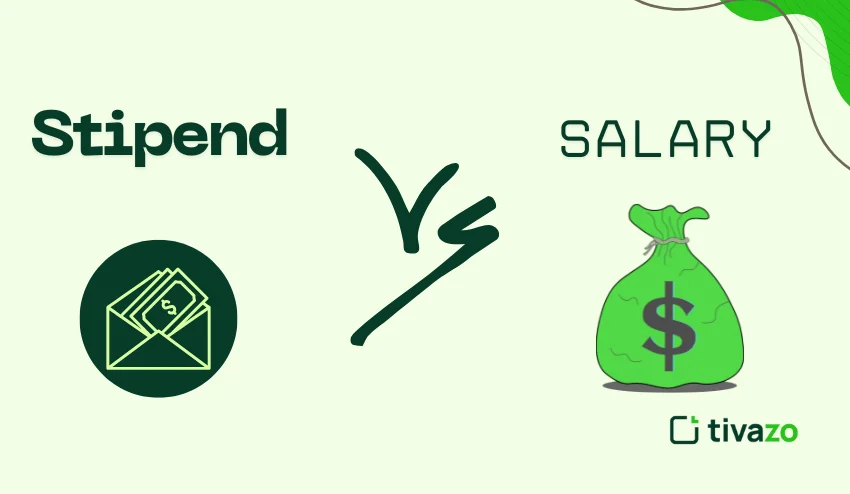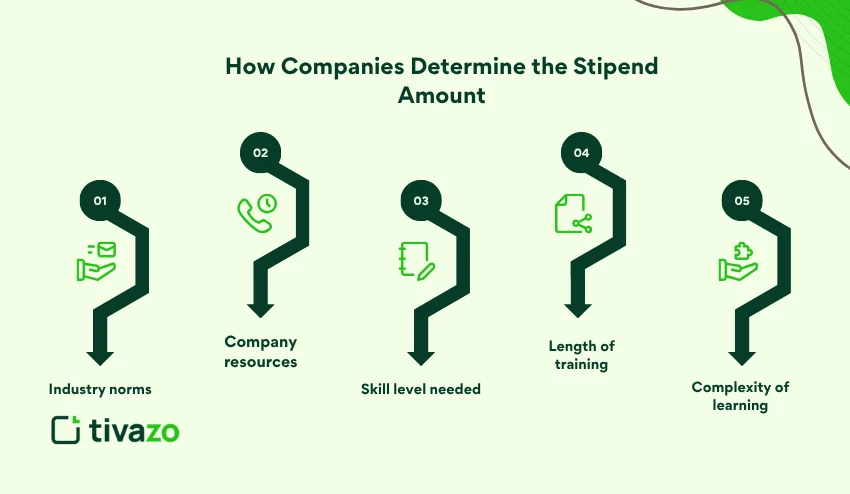What is a Stipend?
The stipend definition is a set amount paid to interns, trainees, apprentices, or other volunteers periodically to assist them with their basic costs of living while they are learning, training, or assisting.
A stipend is not compensation in the manner of a full-time salary, but is a monetary assistance so a person can adequately concentrate on learning, education, or skill development.
Simplified Stipend Definition
A stipend is a set amount of money that does not classify as salary and is given to individuals engaged in learning activities or experiences, as opposed to working as a full-time employee at a job.
Stipend Meaning in Salary

The meaning of stipend in salary is often misunderstood by most people.
A salary is compensation for full-time employment, while a stipend meaning is an allowance for individuals in learning or training situations.
Main Contrasts and Differences
- A salary = payment for job performance.
- A stipend = monetary support for learning or training.
So the stipend, meaning in salary, is simply:
A stipend is NOT a salary, but a living allowance to use while engaging in non-salaried activities.
Reasons Employers Pay Stipends
Employers typically pay stipends for four reasons:
- To incentivize people to come to an internship with the internship’s company
- To support the expense of attending a formal educational program
- To encourage volunteers or participants in a research project
- To lessen the financial burden placed on hired trainees.
Additionally, employers utilize a stipend meaning payment support to draw in dedicated learners and build a talent pipeline that could continue to employ the individual later. A stipend also creates opportunities for people who may not have the means to accept an unpaid internship. Stipends allow organizations to ensure fairness and equity, encourage participation in training programs and allow the participants to develop skills to focus on the skills rather than the money they will not be receiving.
Understanding the meaning of stipend clarifies that it is intended to be a form of support, but not meant to be full compensation.
Reasons Why Employers Provide Stipends
Organizations often provide stipends to:
- Engage participants in internships
- Facilitate learning initiatives
- Support engagement in volunteer or research opportunities
- Help mitigate the financial costs for learners
Similarly, stipends can help an organization attract talented people who might not be able to participate due to financial issues. They ensure motivated learners stay engaged in training, and they create a structured way for someone to gain experience while pursuing skill-based learning initiatives. A fundamental understanding of the stipend meaning parameters also helps learners understand that the stipend is a form of support rather than full compensation.

Categories of Stipends
Understanding the distinctions between stipend categories promotes a fuller comprehension of stipend implications, because each category accompanies a diverse purpose and audience.
1. Internship Stipend
The most popular type of stipend, typically paid to interns working at corporate companies, enables the student intern to receive cash or other financial assistance to help with basic living expenses while they gain practical work experience in a business setting.
2. Research Stipend
This stipend is paid to scholars, researchers, and PhD students in support of their academic endeavors. The stipend provides cash or other forms of financial assistance to help researchers cover costs associated with their research, such as research materials, travel, or living expenses, during the research period.
3. Training or Apprenticeship Stipend
This stipend is paid to trainees who are learning a trade, skill, or profession. The stipend meaning is intended to pay for whatever it may cost for the individual to devote all of their energy, time, and resources to learning the trade, skill, or profession without immediate financial dilemma.
4. Volunteer Stipend
This type of stipend is often paid by non-governmental organizations (NGOs) and social organizations. The stipend is intended to pay for basic living expenses, travel, or food for volunteers, while allowing volunteers to engage in and donate time and energy to social causes, without placing its financial burden on the volunteer.
5. Academic or Fellowship Stipend
This stipend is for often provided to students that are by way of a fellowship or grant. It can often pay students’ tuition (fees), living expenses, or educational resource needs while allowing students to fully devote their energy and efforts to their studies or research.
6. Travel or Allowance Stipend
This stipend is offered to help with transportation, meals, or commuting expenses. It ensures that individuals engaged in programs, internships, or volunteer positions will not face a financial burden related to travel or the day-to-day living logistics.
What is a $200 Stipend?
For example, if someone is receiving a stipend of $200, that person will be given $200 as a fixed amount of money, which is typically provided monthly or weekly, or as a one-time sum, depending on the organization and program. The stipend is intended to assist with everyday expenses (which can include things like food or transportation needs or paying a basic amount towards living expenses) while the person is centered on training, learning, or contributing to a program or project.
It does NOT provide payment based on hours worked, performance, or full employee responsibility, but rather provides a consistent financial support in exchange for a person being able to engage in a purpose of learning or volunteering while minimizing their everyday access to cash challenges to meet their needs. Although $200 will never replace a full salary, small financial support like this is significant to support learning and engagement with the skill-building process.
What Does It Mean to Receive a Stipend?
When an organization pays someone a stipend, it is a:
- Fixed or predetermined amount of money
- The recipient is not considered a regular employee for full-time work
- Payment or allowance supports a person’s learning, training, or volunteering experience
- The recipient is typically not receiving employee benefits such as insurance or bonuses
- The stipend amount is often expected to cover essential daily living costs, but it is not expected to cover everything financially
- A stipend allows people to focus on their experience, skill development, and/or educational goals without worry of expenses.
- Stipend is usually a fixed amount and does not change in height or severity due to the participant’s hours worked or performance.
These distinctions are important to understand in a professional environment and educational context; a stipend allows for financial support, but is not a formal salary.
Stipend vs Salary: What Is the Variation?

Clarifying stipend impresses when compared to a salary.
Distinction Chart: Stipend vs Salary
| Feature | Stipend | Salary |
| Primary Purpose | Support during training | Full payment for work |
| Employment Status | Generally non employee | employee |
| Amount | A fixed stipend is usually lower | Fixed monthly Payment is usually higher |
| Tax | Variable depending on rules | Always tax |
| Benefits | Rarely available | May have ( insurance and PF, etc) |
| Based On | Learning or Training | Work Duties |
| Example | Internships, training, Admin | Full-time job roles |
Which is More Beneficial: Stipend or Salary
If just beginning a career → providing a stipend allows you to gain valuable experience, engage in real-world work, and learn new skills without the commitment of full-time work.
If income is sustainable over time → salary is more appealing because of the stability, benefits associated with (insurance, retirement contributions), and even promotion potential.
Stipend meaning is often connected with education, internships, and training, meaning the focus is on learning and skill development. A salary is positioned as working formally, the responsibility of a consistent role, and on the path to financial security. Deciding between the two usually depends on manipulating career interests, stage, and meeting responsibilities.
Advantages of a Stipend
Stipends provide a number of benefits for students or trainees.
1. Financial Assistance: Helps support basic living costs such as travel, food, or lodging.
2. Skill Acquisition: Allows the recipient to focus on their scholarship or training experience without the financial burden of a part-time job.
3. Entry Into Employment: Internships with stipends help people gain experience and also to build a résumé.
4. Flexibility: Stipends often come from positions that have flexible working hours or tasks that tend to be focused on learning and development.
5. Career Exploration: Stipends provide an opportunity for limited work experience in a particular field without a commitment to a full-time job.
Are Stipends Taxed?
The guidelines around stipends and taxation depend greatly on the country and what type of stipend being offered.
In many cases:
- Some stipends are fully taxed as if they were an income source.
- Some educational stipends are not taxed if paid wholly for tuition or course-related expenses.
- Research stipends, or fellowship stipends, may have unique rules or partial exemptions depending on the government rules in place.
Do you maintain proper documentation of all stipend payments? Consult a tax specialist as needed. Always check with the appropriate tax guidelines for the country where the stipend is supported, and be aware of the financial implications of what the stipend means financially, on any compensation report.
How Companies Determine the Stipend Amount

Factors:
- Industry norms
- Company resources
- Skill level needed
- Length of training
- Complexity of learning
The stipend’s meaning slightly changes as one moves between States and modes of engagement, but never leaves the meaning of stipend as an allowance, not a salary.
Is a Stipend Worth it?
A stipend is worth it if…
- You want to learn
- You want experience
- You are shifting to a new field
- You don’t mind getting paid less at the outset.
Understanding stipend meaning will provide better career choices.
Conclusion
The stipend meaning becomes clearer and clearer as you realize it is an amount of money for learning, not a salary for employment. Stipend=money for learning and training. So if you are an intern, an apprentice, a researcher, or a volunteer, knowing the stipend meaning will allow you to make informed career and financial decisions.
This complete guide to stipend meaning has provided all the information from types of stipends and stipend benefits to taxation and stipend vs salary, so that you understand stipends moving forward through time and beyond.




